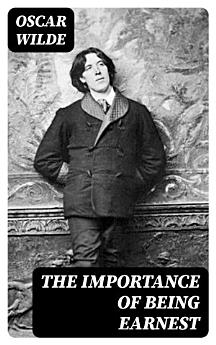The Importance of Being Earnest
нов 2022. · DigiCat
Е-књига
53
Страница
family_home
Испуњава услове
info
reportОцене и рецензије нису верификоване Сазнајте више
О овој е-књизи
Oscar Wilde's "The Importance of Being Earnest" masterfully critiques the Victorian norms surrounding identity, marriage, and social expectations through razor-sharp wit and comedic brilliance. Set in the context of late 19th-century England, this play employs paradox, satire, and epigrammatic dialogue to explore themes of deceit and the frivolity of societal conventions. The dual lives of its protagonists, Jack and Algernon, serve as a vehicle for Wilde's exploration of authenticity and the absurdity of social pretenses, culminating in an exquisite tapestry of humor and profound observation. Wilde, a prominent figure of the Aesthetic Movement, was known for his flamboyant style and keen intellect, drawing upon his experiences in high society and his own struggles with identity. His background in classics, combined with a sharp literary acumen, allowed him to weave intricate plots that entertain while simultaneously challenging prevailing moralities. This play, written during a time of rigid social structures and censorship, reflects Wilde's desire to subvert expectations and question the authenticity of self. For anyone intrigued by the intersection of comedy and social critique, "The Importance of Being Earnest" is an essential read. Its delightful characters and clever dialogue make it not only an enduring classic but also a reflection of the complexities of human behavior and societal pressures. Wilde's keen observations and timeless humor resonate with readers, making this play a delightful exploration of earnestness and farce.
О аутору
Oscar Wilde (1854–1900), the esteemed Irish playwright, poet, and author, is celebrated for his brilliant wit, flamboyant style, and infamous imprisonment. Born in Dublin, Wilde became one of London's most popular playwrights in the early 1890s. Educated at Trinity College, Dublin, and Magdalen College, Oxford, Wilde was a proponent of the aesthetic movement, which advocated for art's sake. His literary contributions include a wide range of works, from the novel 'The Picture of Dorian Gray' to a series of acclaimed plays such as 'Lady Windermere's Fan' and 'An Ideal Husband'. 'The Importance of Being Earnest' (1895) stands as his masterpiece, a farcical comedy that highlights Wilde's dazzling linguistic agility and superlative command of satire and social commentary. The play's success was shadowed by Wilde's legal trials for 'gross indecency', a result of his homosexual relationships, which led to his imprisonment and eventual exile in France. Despite his premature death, the legacy of his works continues to be celebrated, forming an integral part of the Western literary canon. Critiques see Wilde's work as an astute dissection of Victorian mores, delivered with an irony and elegance that remain influential to this day.
Оцените ову е-књигу
Јавите нам своје мишљење.
Информације о читању
Паметни телефони и таблети
Инсталирајте апликацију Google Play књиге за Android и iPad/iPhone. Аутоматски се синхронизује са налогом и омогућава вам да читате онлајн и офлајн где год да се налазите.
Лаптопови и рачунари
Можете да слушате аудио-књиге купљене на Google Play-у помоћу веб-прегледача на рачунару.
Е-читачи и други уређаји
Да бисте читали на уређајима које користе е-мастило, као што су Kobo е-читачи, треба да преузмете фајл и пренесете га на уређај. Пратите детаљна упутства из центра за помоћ да бисте пренели фајлове у подржане е-читаче.







